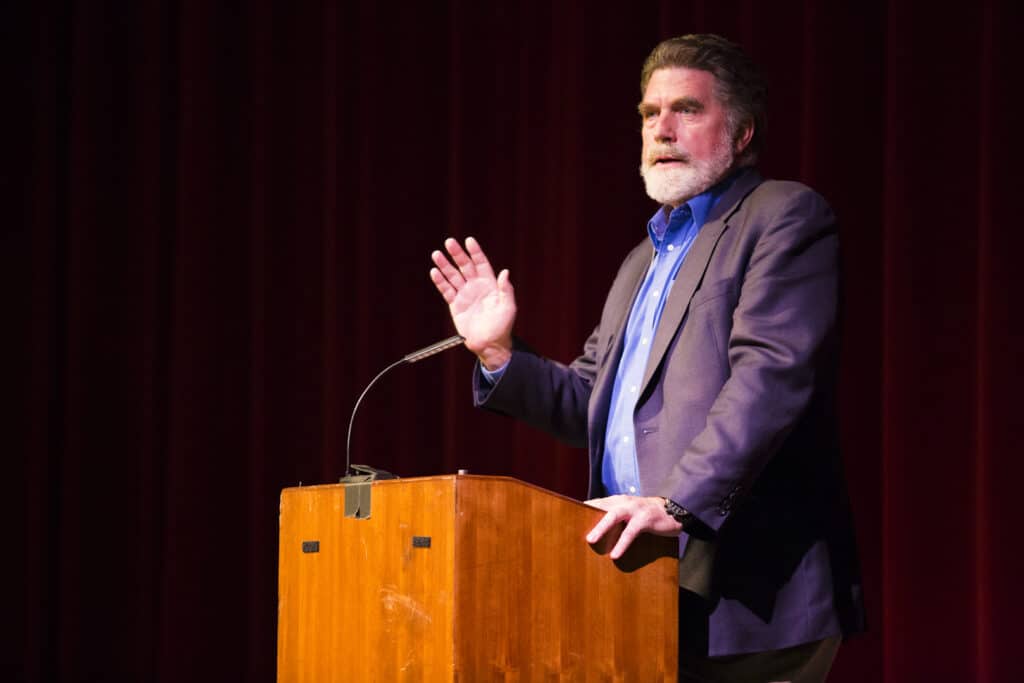Convocation | Brad Roberts ’72
January 25, 2018

Dr. Robert’s presentation was quite timely, unfortunately – just a week following the mistaken January 13 statewide alarm warning all of Hawaii of an imminent ballistic missile attack. The resulting widespread panic only served to heighten nerves already fraught by the escalating tensions between the United States and North Korea. Dr. Roberts addressed the North Korean threat and emerging weapons program as well as the escalating tension between world powers and the anxiety felt by American allies in the Balkans and in East Asia in the wake of what he described as “ … the Trump Administration’s withdrawal from the world stage and from long-standing international agreements.”
After his presentation, Dr. Roberts met with a small group of students and faculty in the McIntosh room for a Q and A session. Questions ranged from the implications of arming U.S. allies with nuclear weapons to the usefulness of NATO agreements such as the Treaty on the Non-Proliferation of Nuclear Weapons. Jeffrey Kim ’19 asked about the development of a sophisticated antiballistic missile defense system, such as the system currently being tested at Vandenberg Air Force Base, just north of Santa Barbara. Dr. Roberts explained that such a system, which could target and shoot down rudimentary missiles would draw the ire and suspicions of Russia and China. History teacher Ivan Barry asked about the possibility of a dirty bomb, an attack that uses enriched material to sicken individuals rather than in an explosive nuclear device. Dr. Roberts outlined the steps of preventing a dirty bomb attack, which he says, to the best of our knowledge, has not occurred in the U.S. “If the 20th century was the century of physics and chemistry, the 21st century will be the century of biologics,” warns Dr. Roberts.
Despite the grimness and gravity of his profession Dr. Roberts remains cautiously optimistic about the state of global affairs. (He’s fairly confident Kim Jong Un will never initiate nuclear war.) At the end of his talk Roberts asked what students could do to prepare for an uncertain and dangerous future. He drew on the thinking of the distinguished American diplomat, George Kennan, who was once asked to describe the attributes of a successful foreign service officer. Kennan’s answer: someone with respect for others (and the knowledge of when to speak and when to listen), honesty (and loyalty to others and oneself), and education (of sufficient breadth to develop strong powers of observation and analysis).
About Dr. Brad Roberts ‘72
Brad Roberts is director of the Center for Global Security Research at Lawrence Livermore National Laboratory in California. From April 2009 to March 2013 he served as Deputy Assistant Secretary of Defense for Nuclear and Missile Defense Policy.
In this role, he served as policy director of the Obama administration’s Nuclear Posture Review and Ballistic Missile Defense Review. From September 2013 through December 2014, Dr. Roberts was a consulting professor and William Perry Fellow at the Center for International Security and Cooperation at Stanford University. Prior to joining the Obama administration, Dr. Roberts was a member of the research staff at the Institute for Defense Analyses and an adjunct professor at George Washington University.
Learn more about Dr. Roberts here.
About Convocation
Convocation is an important tradition of boarding school life at Cate. A series of speakers and performers addresses the School every Monday in the theatre after students and faculty gather for a formal dinner in the Raymond Commons.